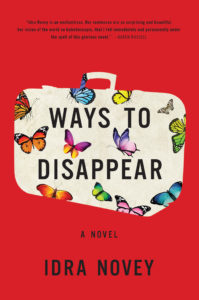Idra Novey is a translator of Spanish and Portuguese literature and the author of the National Poetry Series-winning Exit, Civilian. Her most recent work, the novel Ways to Disappear, seems to connect all her musings about poetry, violence against women, and translation in a way that is both illuminating and thought-provoking. In an interview with Shamar Hill, Novey discusses the basis of her novel in structure and story, moving between genres and language, between ideas of defining oneself and being defined by others. The book is deft, full of music, life affirming and heart breaking.
•••
SH: I sense there is a connection between the titles of your last two books, your novel, Ways to Disappear, and your poetry collection, Exit, Civilian. Can you speak about how they talk to one another?
Idra Novey: Both books are about how to resist being sucked into a history of violence. Is it possible through art? Through honesty? Through climbing up a tree and taking an arboreal leave from one’s life? A few weeks ago, while teaching a poetry workshop at a women’s prison on Rikers Island, I talked with the students about the power of anaphora, of beginning every line in a poem with the same word and then departing from that repeated word in a new direction. Anaphora is both an acknowledgment of what has been said and also a departure from it. I hadn’t thought of it until you asked this question, but maybe the “Exit” in Exit, Civilian, the questions in that book about violence begetting violence, was what was led me to the opening scene in Ways to Disappear.

Image: Flickr/Alison Postma
SH: Translation is clearly important to you. You’ve translated Clarice Lispector’s The Passion According to GH, and Emma, the protagonist in Ways to Disappear, is a translator. What is the magic in translation for you? What are the dangers?
IR: What I find more dangerous than translation is the enduring resistance to acknowledging that translators exist. Why do some presses still hide the translator’s name on the copyright page instead of celebrating the beautiful collaboration that is one mind ferrying the words of another mind into a new language? With Ways to Disappear, I wanted to convey that magical act, the exhilarating adventure of it, and to show the absurdity of being wary of translators and translated words. Translators are the secret heroes of literature, so why keep us a secret?
SH: The first poem in Exit, Civilian is about what is kept secret, too. “The little prison/Has no interest in silence…The wet breath/Of its red bricks/Is all the world hears/From the outside…” Reading these lines, I experience a struggle between breaking silence and being silenced. In Czeslaw Milosz’s words, I feel poetry “as a passionate pursuit of the real.” In your poems, an undeniable realness, speaking as a witness, speaking to the world.
IR: Thank you, Shamar. I approached each line of the novel as I would a poem, with the intent of infusing it with that “passionate pursuit of the real” as well. I wanted Ways to convey that intense witnessing of a moment that we go to poetry for, even though it is maniacally plotted with threats from a loan shark and a gun purchase and a kidnapping and everything else that goes on.
SH: Your work with the Bard College Prison Initiative is obviously part of the narrative thread in Exit, Civilian, but I see it in your novel as well, in the ways the characters talk about themselves, the ways the violence unfolds, and the ways hope emerges in the novel. Can you speak about an experience working for the organization that informed your writing?
IR: I started writing Ways to Disappear while teaching with the Bard Prison Initiative. Every student at the women’s prison where I taught had lived in continual proximity to violence. I witnessed various kinds of violence as a child as well and it is a subject I continually return to as a writer. But both in Exit, Civilian and in the novel, I felt I could risk more and explore the subject of violence in more surprising, less predictable ways if I came at it with surrealism and sly humor.
In the United States, writing that makes us laugh is often discussed as lighter than writing that leaves a person grim-faced, but humor can be profoundly subversive. It can lead to moments of daring revelation that a novel might not reach otherwise.
SH: The sections between chapters, in which you explore the definitions of words, speak to the themes of the novel and the unfolding action of the story. They also seem to serve as a catalyst for you, the writer – almost like, I am doing this and this and this! But the definition sections also have a subversive layer to them. Can you talk about how these sections developed? How they work within the larger novel?
IR: One question driving the novel as I was writing it was how to get around the fixed definitions we all impose on each other and on ourselves. I wanted the definitions to be the opposite of those fixed, predictable explanations we expect to find in a dictionary, and also the definitions we impose on people we just met, and also people we’ve known for years. As a translator, working between languages, you work with the connotations of words, the slippery aspects that aren’t captured in the definition, and I wanted to convey how that relates to the way people, in the choices they make, can slip out of their definitions as well.
SH: The idea of disappearing is prevalent in Latin American literature. I think of 2666 by Bolaño, especially the section “The Part About the Crimes.” But I also think of The Obscene Bird of Night by José Donoso, which is really struggling with the existential idea of being and not being, existing and not existing. Ways to Disappear is part of this conversation.
IR: I am a fervent admirer of José Donoso’s fiction, which is less known to American readers than Bolaño. But The Obscene Bird of the Night is among my favorite novels as well, and yes, I was profoundly aware while writing Ways to Disappear of the significance of the word “disappear” in Latin American history and literature, but also of its significance in the history of women writers and of translators, who have both historically disappeared from the public record if they were even seen, briefly, in the first place. In that regard, being a translator, and being a woman writer, is to struggle continually with existing, and not existing, at the same time.
SH: Can you talk about some of the women writers who have disappeared from public record?
IR: Well, that would depend on which public record we’re talking about. Eliot Weinberger says a poem dies when it has nowhere else to go—meaning that a poem that doesn’t continue to get translated is bound to perish. I would say that is true with novels as well. Translation keeps great writing alive. Elvira Hernandez and Ch’oi Yun are two women writers whose work is not widely available outside their own languages, though their work really deserves to be translated and internationally known. Elvira Hernandez wrote a poem, “The Chilean Flag,” which many in Chile consider to be one of the boldest and most important poems in response to the Pinochet dictatorship, but Elvira’s work is barely known outside of Chile, and her poems are brilliant. Ch’oi Yun is a Korean writer who I came to know through a student familiar with her stories. Yun’s work is quietly radical in its intent in a similar way to the novels of Hungarian writer Magda Szabo, whose work wasn’t known outside Hungary until her seventh novel, The Door.
It’s absurd that it is still the case, but I think there is still a tendency to underestimate the literary significance of women writers early in their careers. They have to write three or four books before receiving international attention, or die, or perhaps disappear into a tree, as the writer does who I invented in the novel—for all the reasons discussed above.
SH: I see the influence of Clarice Lispector in your work, in structure, the way you use plot, the use of the absurd. Can you talk about Lispector, who I feel is so undervalued in the US, as she relates to your work? Also, Lispector’s writing, like yours, is very political. I am thinking of The Hour of the Star, and how she explores beauty, wealth, love, and loneliness.
IR: Well, I’m immensely flattered to know Lispector’s influence is notable in Ways to Disappear. I was translating The Passion According to G.H. while writing it and I see G.H. as a deeply political novel about class and race and gender. G.H. is a bit like the Moby Dick of Brazilian literature. Moby Dick is about a whale and G.H. about a cockroach, but both are about reckoning with something the characters are resistant to see straight on. That indirect, nuanced approach to a novel’s central driving theme felt instinctive to me as a writer as well.
SH: Ways to Disappear in many ways is about self-actualization. The author, Beatriz, and her translator, Emma, are searching for the self, and reinventing the self in another language and culture.
IR: I see it as a novel about self-reckoning, too, and not just with how the characters redefine themselves, but also about how they move beyond the narrow definitions they impose on each other. When an unforeseen event explodes the way you see the people you know best, it inevitably leads to some kind of demolition of whatever construction you’ve created for your own identity as well.
SH: What I find so compelling is how you constantly challenge your own voice, your own writing. Many writers find comfort in a style or voice that has worked for them. You seem to not be interested in that.
IR: I find the more risks I take in terms of form or voice, the more risks I take with the questions the book is moving toward as well. And why not remain open to annihilating earlier notions of what any of us are going to say next? The playwright Sarah Ruhl has an essay about being continually interrupted by her children and worrying she’d never be able to write the way she used to, before they born. But then she decided to embrace the interruptions instead, to say go ahead, annihilate me. That earlier self was a fiction anyway.
SH: Does the reader participate in the act of translating? If so, how? And is that important to the translator during the act of translation?
IR: Reading is a kind of translation. You have to translate the words on a page into meaning in your mind. And good translators are continually thinking of what a reader will “translate” as the meaning of any given sentence. The art of translation is an art of conversation. You have to create and sustain a dialogue between a writer other than yourself and a reader who is not you. It is a fascinating, complex process and trying it out can teach writers quite a bit about their own voices and what they’d like to communicate to future readers. I wish every creative writing program in the country offered translation workshops.
SH: I see our writing as not only having a conversation within literature and our readers, but as part of a public debate. What thread/threads does your work add to that conversation?
IR: I’d say that is a question for readers of the novel to answer.
•
 Shamar Hill is the recipient of numerous awards including a New York Foundation for the Arts Fellowship. He has been published and has work forthcoming in the American Reader, Tinderbox, Rumpus and Southern Humanities Review. He is working on his first poetry collection, Photographs of an Imagined Childhood, and a memoir, In Defiance of All True Things.
Shamar Hill is the recipient of numerous awards including a New York Foundation for the Arts Fellowship. He has been published and has work forthcoming in the American Reader, Tinderbox, Rumpus and Southern Humanities Review. He is working on his first poetry collection, Photographs of an Imagined Childhood, and a memoir, In Defiance of All True Things.
 Idra Novey is the author of the debut novel Ways to Disappear, a New York Times Editors’ Choice and recently longlisted for the Brooklyn Eagles Prize. Her most recent poetry collection, Exit, Civilian, was selected for the 2011 National Poetry Series. She’s written for The New York Times, New York Magazine, NPR’s All Things Considered, Slate, and The Paris Review. She’s also translated a number of authors from Spanish and Portuguese, including Clarice Lispector’s novel The Passion According to G.H. She’s taught at Princeton University, Columbia, NYU, Fordham, the Catholic University of Chile, and in the Bard Prison Initiative. In Fall 2016, she will be the Visiting Writer in the MFA Program in Creative Writing at LIU Brooklyn.
Idra Novey is the author of the debut novel Ways to Disappear, a New York Times Editors’ Choice and recently longlisted for the Brooklyn Eagles Prize. Her most recent poetry collection, Exit, Civilian, was selected for the 2011 National Poetry Series. She’s written for The New York Times, New York Magazine, NPR’s All Things Considered, Slate, and The Paris Review. She’s also translated a number of authors from Spanish and Portuguese, including Clarice Lispector’s novel The Passion According to G.H. She’s taught at Princeton University, Columbia, NYU, Fordham, the Catholic University of Chile, and in the Bard Prison Initiative. In Fall 2016, she will be the Visiting Writer in the MFA Program in Creative Writing at LIU Brooklyn.


